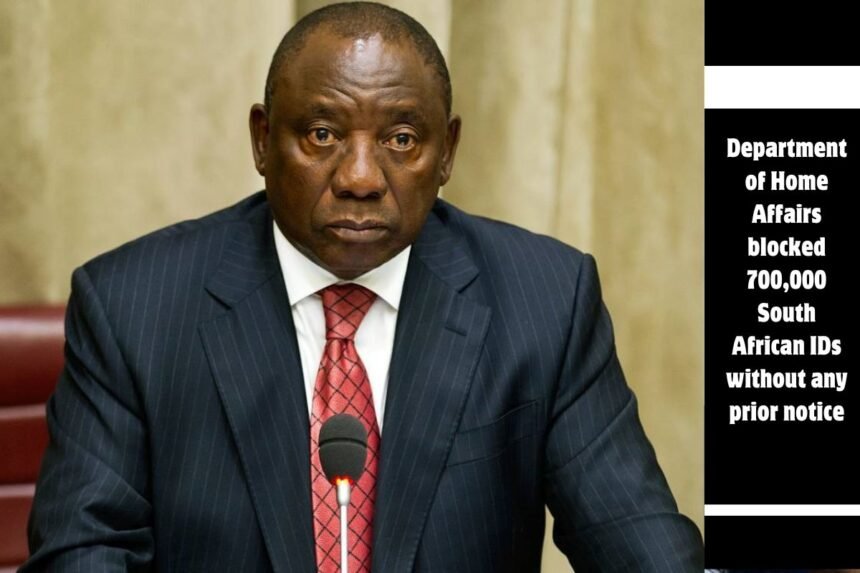Right now, there is a big controversy in South Africa over the Department of Home Affairs (DHA) not following through on a court order to release blocked identity papers (IDs). Approximately 700,000 South Africans have been affected by this problem. It shows how important fair administrative processes are and how much bureaucratic choices can change people’s lives.
The Pretoria High Court said that the DHA had blocked these IDs without taking the right steps, which made what they did illegal. Because of this, a lot of South Africans are stuck in legal and existential limbo and can not do simple things like banking, getting passports, or renewing their driver’s licenses.
Legal Battle and Non-Compliance
The Pretoria High Court recently said that the DHA’s practice of blocking IDs was not legal because it was not done in a fair way, according to the court. The court order said that the DHA had to follow the Promotion of Administrative Justice Act (Paja). This law says that the department has to let people know when choices are made that affect their rights. The court gave the DHA 90 days to follow this clear order, but they didn’t. The deadline expired last week.
Lawyers for Human Rights’ Thandeka Chauke, who is in charge of the Statelessness Unit, was angry that the DHA was not following the rules. Chauke says that the DHA’s lawyers have not been in touch to explain the delay. This lack of response has put thousands of people in a state of stress and doubt.
Impact on Affected Individuals
There are a lot of bad effects that come from having a blocked ID. People in South Africa who do not have legal IDs can not do important things like bank, renew their driver’s licenses, or get passports. A lot of people do not know their IDs are blocked until they try to use them for these things.
Chauke pointed out that Lawyers for Human Rights clients were not told why their IDs were being revoked, so they had to look into the matter on their own. That the DHA is not open and responsible for what it does is made clear by this case.
It is sad to read about the people whose IDs were blocked. Some cases go back to the early 2000s, and the people who were harmed had to wait years for help from the government. Long-term ID suspensions have had terrible affects, like people losing their jobs and not being able to support their families. Parents whose IDs are blocked have more trouble registering their children, which means that paperwork problems are passed down from one generation to the next.
Also read;-SASSA Stops SRD Grant Payments, biometric verification mandatory for the beneficiaries
Judicial Insights and Broader Implications
High Court Judge Elmarie van der Schyff agreed that it was hard for the DHA to keep track of fake IDs given to people who are not from South Africa. She said that South Africa has problems with illegal immigration and identity theft because it is a popular place for people to move to. To deal with these problems, the DHA put in place ID-blocking to make sure that identity numbers that were processed in a suspicious way were not real. Judge van der Schyff, on the other hand, did not like how the DHA was doing things. He said that blocking IDs before probes were over was unfair to real citizens and permanent residents.
Lawyers for Human Rights were happy with the court’s decision, which they see as a big step toward stopping ID blocking, which they think is unfair. Chauke stressed how important the judgment was for giving those affected back their respect and called for systemic changes to be made in the DHA to stop more injustices.
Moving Forward and Seeking Resolution
The court’s decision includes a monitoring order, which means that the court can keep watching to make sure that the DHA follows the order. Lawyers for Human Rights is going to keep working to help people who have been harmed and to get the DHA to review and improve its own rules. This includes making sure that the ideals of administrative justice and openness are followed.
In the meantime, the group has started a campaign with the phrase #UnblockMyID to get people to talk about their experiences and raise awareness. Chauke tells people whose IDs have been blocked to keep spreading the word and holding the DHA responsible for what it does.
Many South Africans have been hurt badly because the DHA did not follow the court order. It is important to remember how important administrative justice and openness in government work are after this ruling. Now, the DHA needs to take care of these problems right away so that everyone in South Africa can get the documents they need to live a safe and respectable life.
